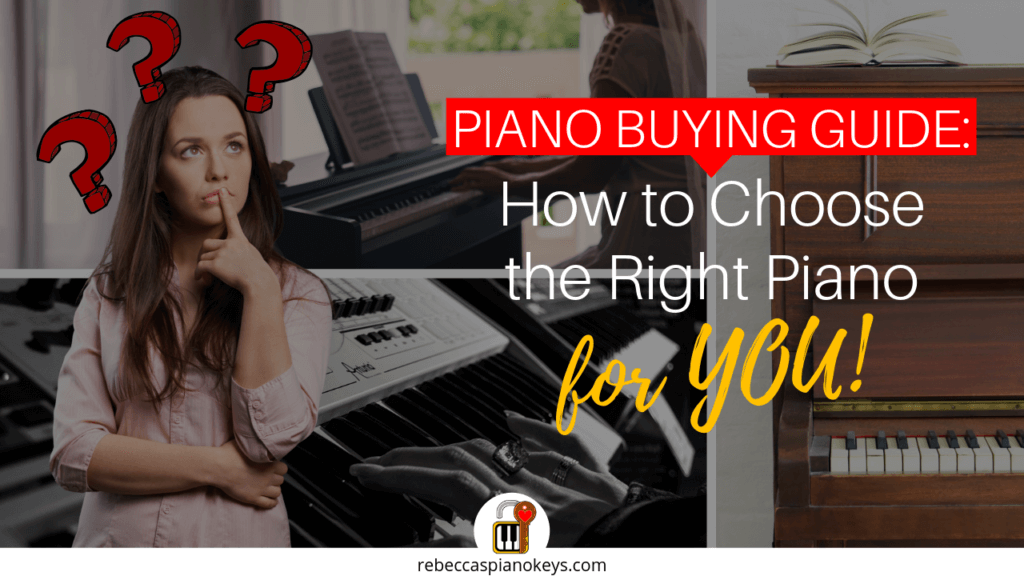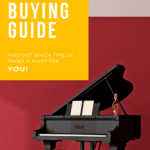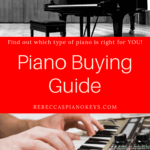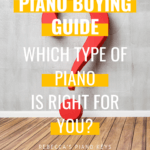Last Updated on September 12, 2021 by Rebecca
*I am not an affiliate for any of the brands/companies/products mentioned in this post. This post is for information purposes only!
The truth is, the right piano for you might not be the right piano for someone else.
The first thing you'll need to consider is what type of instrument suits your personal piano dreams, and your current lifestyle. And since everyone's dreams and lifestyle are different, there is no one size fits all!
There are 3 main categories to choose from when it comes to selecting the best piano to suit your needs: acoustic pianos, digital pianos, or electric keyboards.
In recent years, a fourth category, the hybrid piano has emerged. From what I understand, they are acoustic pianos with electric components incorporated. The best of both worlds! I won't discuss those in any further detail in this post since I have no experience with them, but they sound like fabulous instruments! (And I imagine they would be quite expensive.)
What I will discuss in this post are the advantages and disadvantages of acoustic pianos, digital pianos, and electric keyboards, as well as common quality brands of each. By the time we're done here today, you'll know exactly which type of piano is right for you!
No time to read now? Pin it for later!

Acoustic Pianos

These are your traditional, old-school pianos. Ones that don't plug into the wall and are filled with strings. When you depress a key on an acoustic piano, a felt hammer inside the piano strikes the metal strings of the piano. The vibration of those strings is what produces the sound. (It's actually very similar to how a guitar produces sound.)
Advantages of Acoustic Pianos
- You get a full 88-key keyboard.
- You get the most natural piano sound.
- You do not need electricity. (Hello magical, musical piano sessions during power outages!)
- You get that special “posh” feeling of playing on “the real thing.” (If that's the kind of thing that matters to you.)
- They are often available for cheap (or even free!) on classifieds or garage sale websites and pages.
- They come with pedals. (All acoustic pianos have a damper/sustain pedal and a soft/una corda pedal. Many also have a sostenuto pedal.)
Disadvantages of Acoustic Pianos
- Even the smallest acoustic pianos are quite large. They take up a fair bit of space, and it can be difficult (or impossible?) to move them around tight corners and through stairwells, etc. (I know someone who had to remove the window from her living room in order to get her piano into her house!)
- It's not easy to move an acoustic piano, strictly in terms of man-power (woman-power?). There's just no getting around the fact that they are heavy beasts!
- They require regular tunings, by a professional. TakeLessons.com recommends tuning at least twice a year, and says an average tuning costs around $100. That being said, be aware that the more out of tune your piano is, the more expensive the tuning service costs.
And no, you can't just tune them yourself like you would with a guitar. Don't believe me? Check out this video of a man who tried! (I mean, you could tune it yourself, but a piano has over 200 strings, so why would you want to?!)
Acoustic Piano Brands to Consider
Steinway & Sons
Steinway & Sons is the cat's meow of the piano world. If you meet someone who owns one, just marry them, immediately. Even if you're already married. Getting your hands on a Steinway is worth the trouble this plan would lead to! (Ok, I'm kidding. That's terrible advice! But I stand by my statement that Steinways are the best of the best. I've never played one, but I would jump at the chance!)
Yamaha
Yamaha makes excellent acoustic pianos. I've never owned a Yamaha acoustic piano, but I've played on several, and if I were buying an acoustic piano, I would be over the moon to get my hands on a shiny new-ish Yamaha.
Yamaha also has models that are much more affordable compared to many other piano brands… although is any brand new piano really affordable? When people use the word “affordable” to describe a brand new piano, they mean the piano “only” costs around $5000.
Kawai
Another well-known quality brand is Kawai. I know very little about Kawai pianos, but I've heard good things about them. So if you're shopping for a new acoustic piano, this is a brand you may be interested in looking into.
My Childhood Piano
The piano I grew up with was a Willis & Co Limited (a Canadian piano company that no longer exists). I have no idea how they rank in terms of quality, but I was always satisfied with it! It held it's tuning very well (we had it tuned a lot less frequently than we should have) and it always felt nice to play. Unfortunately, last time we had it tuned, the tuner declared one of the keys untunable, which was disappointing to say the least!
Digital Pianos

Digital pianos are generally considered the next best thing to an acoustic piano. They are intended to mimic the feel of an acoustic piano, while also providing some of the benefits and added features of an electric keyboard. They rely on electricity, and sound is produced through speakers inside the piano.
I currently own 2 digital pianos, which I'll discuss more in the section about different brands of digital pianos.
Advantages of Digital Pianos
- They have full 88-key keyboards.
- They never require tuning.
- They fit easily into tight spaces. (If you take the stand apart, you can even fit the whole thing into the back seat of your car! I've done it!)
- They are not portable, but they are easier to move around than an acoustic piano. (You won't likely be taking them to any gigs with you, but the thought of moving a digital piano to a new room in your house, or to a whole new house altogether, won't give you an aneurysm.)
- A high quality digital piano comes as close as possible to the playing feel of an acoustic piano, without actually being an acoustic piano.
- They come with varying amounts of extra built-in features, like multiple voicings, metronomes, backing tracks, recording capabilities, teaching tracks, etc.
- You can plug in headphones for private practice… which means no more angry neighbours or crying babies if you decide you feel like playing at 2am! (Although the keys still make a “tock-tock-tock” sound as you play, which I've been told is bizarre and unnerving for others in the room.)
- You can hook a digital piano up to your computer for recording and mixing.
- Many digital pianos come with a solid stand and bench, which are very sturdy and also give the instrument more of a “real piano” look.
- Most digital pianos come with pedals, same as an acoustic piano.
Disadvantages of Digital Pianos
- They require electricity. (So much for your romantic power-outage candle-lit piano sessions!)
- No matter how good they are, they never quite feel like an acoustic piano. (Although some definitely come closer than others!)
- A quality digital piano is still relatively expensive, in the $1000-3500 range.
- Not all digital pianos come with pedals, so be careful with your selection when shopping!

Digital Piano Brands to Consider
Yamaha
Yamaha makes excellent digital pianos. They are just plain good quality.
My Yamaha Clavinova CLP-133 (featured in the header image) is very old. It was around 5 years old when I bought it 6 years ago. So it's not a feature-packed as newer models probably are. But it has a nice feel, produces good sound, and looks pretty darn classy, if I do say so myself! (One thing I don't like is that the pedal is kinda clunky and makes noise in my recordings.)
When I eventually upgrade to a new digital piano, I will be looking for a new Yamaha… or a Roland. Those would be my 2 personal preferences.
Roland
Roland is also an excellent brand for digital pianos. I've played on a few and been happy with them, and I've only ever heard good things about them.
Kawai
Kawai is another good brand of digital pianos. I've never played on one myself, but I've heard a lot of good things about them. They are a reputable brand.
Casio
Casio is a decent brand for digital pianos. If you're on a bit of a budget but still want a good quality instrument, Casio may be the brand for you. The piano I have in my studio for my students is a Casio Privia PX-860. I bought it brand new about 3 years ago, so it has a lot more features than my old Yamaha.
But I won't be looking to buy another Privia again in the future. I just don't like it that much. It's solid, creates great sound, has a lot of useful features, and the pedal doesn't clunk like my old Yamaha does. But I just don't like the feel of it. The keys don't give as much resistance as I would like, and that makes it feel a bit cheap, in my opinion.
Electric Keyboards

Electric keyboards range from super simple, cheap models, to super complex instruments with a million extra knobs and features. An electric keyboard is an instrument all to itself… it functions similar to an acoustic piano, in that the keys are laid out the same and you depress a key to create a sound… but it's really not intended to mimic an acoustic piano.
As a classically trained pianist, I really don't have much experience with electric keyboards. They just aren't the ideal instrument for me. The cheap ones are ineffective for what I want to do at my skill level, and the high-end ones are full of features that I haven't been exposed to and wouldn't know how to use to their full potential, and I don't have need of one for portability..
Nevertheless, they may very well be the ideal instrument for you, so read on to find out more!
Advantages of Electric Keyboards
- They are portable! Most often, they are on a simple folding stand and the whole setup can be easily taken apart, thrown in your car (ok, well not thrown!), and taken wherever you will!
- They are available in a range of sizes.
- They never require tuning.
- You can plug in headphones when you play.
- They include extra features like multiple voicings, metronomes, backing tracks, recording ability, synthesizing, and quite a lot more that I really don't know about.
- You can hook them up to a computer for recording.
- Some of them come with companion apps to help you learn.
- There are some very inexpensive models, ranging from $150-300, depending on the size you want. (Although the fancy ones with all the bells and whistles are considerably more expensive!)
Disadvantages of Electric Keyboards
- Some of them are very poor quality, so you really need to know what you're shopping for.
- Some (like MIDI keyboards) require external speakers.
- They require electricity.
- The ones with fewer keys limit your musical range.
- Most of them require you to purchase a stand and bench that are sold separately.
- Most do not have pedals. And the ones that do have pedals… it's generally just the damper/sustain pedal, and it's generally just a loose piece that sits on the ground and is hooked up to the keyboard with a wire (a lot like the foot pedal of a sewing machine). I find these really annoying because they don't always stay put.
- Sometimes their keys are smaller than the standard size, so you really have to be careful when shopping to make sure you know what you're getting.
Electric Keyboard Brands to Consider
Higher-End Brands
Again, I have to remind you that as a classically trained pianist, I'm a bit out of my depth in the world of keyboards. But from what I've heard, the go-to brands in the keyboard world are Yamaha (what can I say, they do everything piano related!), Roland, Korg and Nord.
An Economical Starter Brand
If you're just looking for something cheap to start on, the Alesis keyboards on Amazon look decent and range from about $300-500, which is cheap for a full-sized 88-key instrument!
The Alesis Recital has 88 semi-weighted keys. And if you're able to bump it up a couple hundred bucks, the Alesis Recital Pro has 88 hammer action keys. Keep in mind neither of these comes with the stand and bench, so you'd need to buy those separately, which adds to the expense.
However, I've yet to actually try either of these Alesis keyboards, so at this time, I can't personally speak to their quality. But just from looking at the specs, it's a brand that I would suggest as a decent starter for those who just want to test the waters before committing to a more expensive instrument.
Still not sure whether an acoustic piano, digital piano, or electric keyboard is right for you?
No problem! I've created a handy flow chart to help guide you in making your decision!
(And I was surprised to find out that the process of creating a flow chart is more difficult than I expected! It's quite the mental puzzle figuring out which question belongs where in the chart! But I got it worked out, and it is beautiful… if I do say so myself!)
Next Steps
Have you decided that the right piano for you is either a digital piano or an electric keyboard? In my next post, I'll explain the features you need to understand when shopping for your new instrument!
Share Your Thoughts!
Are you on the market for a new piano? What kind are you considering, and why? If you could have any piano you want, without any limitations whatsoever, what would your dream piano be? Do you already have a piano at home? If so, what kind do you have? And finally, what do you feel was the single most useful bit of information in this post?
And remember… these share buttons are here for a reason! If you know someone who would appreciate this article, share it with them!






The piano is my favorite instrument. I have my great-grandmother’s old Baldwin in my dining room. It’s about 80 years old and out of tune, and I’d like to get it fixed one day. I never took formal lessons besides a semester of keyboarding club in middle school, but I learned to play a few songs over the years. I’ve probably forgotten how now. This was a fun read. Thanks for sharing your expertise!
Hi Laura! I’m glad you enjoyed the post! Your grandmother’s old piano sounds lovely! What makes the piano your favourite instrument? Do you just love listening to it?
I had no idea there were so many types of pianos out there. I tried to learn to play when I was young but I’m a bit impatient and couldn’t sit still long enough to really learn. Maybe I’ll try now that I’m a bit more “seasoned”. Great information, especially if one is looking to purchase their first piano.
Hi Lynette! That’s such a common experience where people start learning piano as kids then get away from it and as adults they toy with the idea of trying again. It can be a ton of fun to get back into piano as an adult, especially if you get into piano improvisation!
Ugh! I love and miss my piano so much. I’m classically trained but I gave up 7 years ago and haven’t touched one for a long time until the other day. I found one in a cafe that was free for locals to play on. I tried to play something but I’ve pretty much lost my skill. So sad! I will definitely be getting a piano back into my life again.
Hi Leyla! That sounds exactly like me about 10 years ago! I was so heartbroken when I found pianos in unexpected places… I wanted to play them so bad, but couldn’t remember how to play anything! Getting back into piano was one of the best things I’ve ever done! It brings so much joy into my life! Now, when I see a piano, I can ALWAYS play something! 🙂
Love how helpful this post is!!
Thanks Amy! I’m glad you found it helpful! 🙂